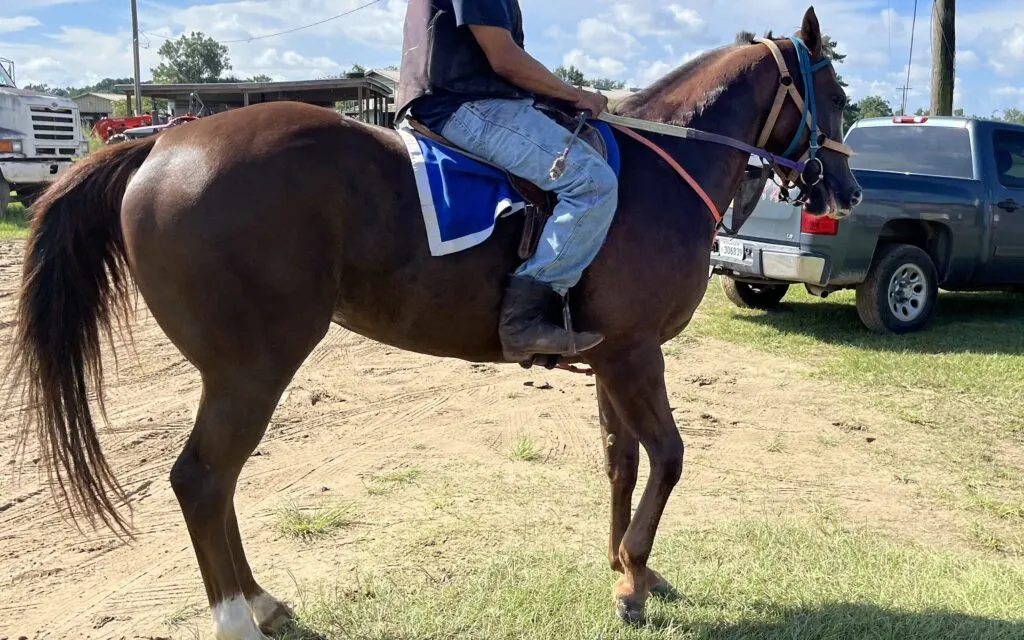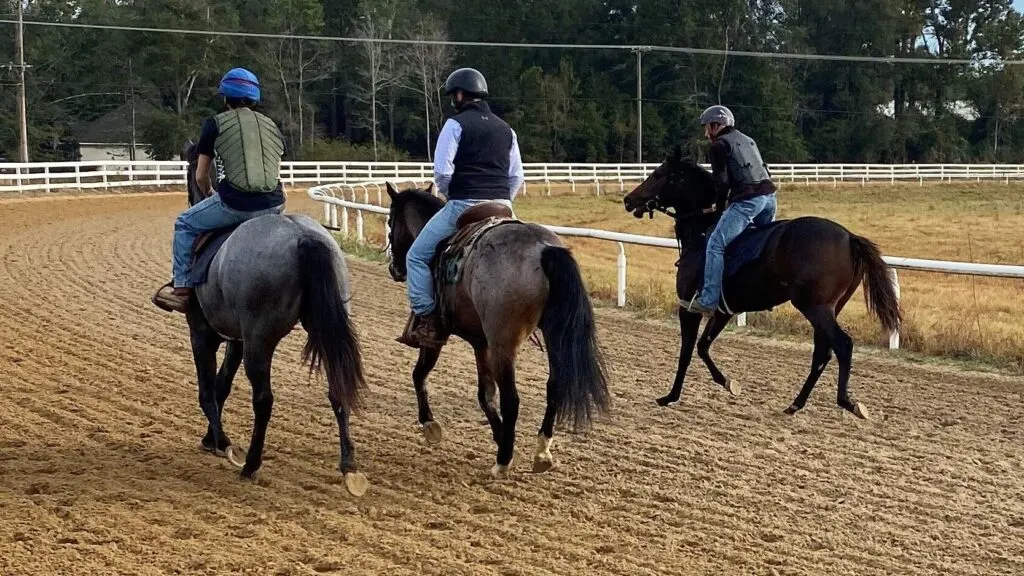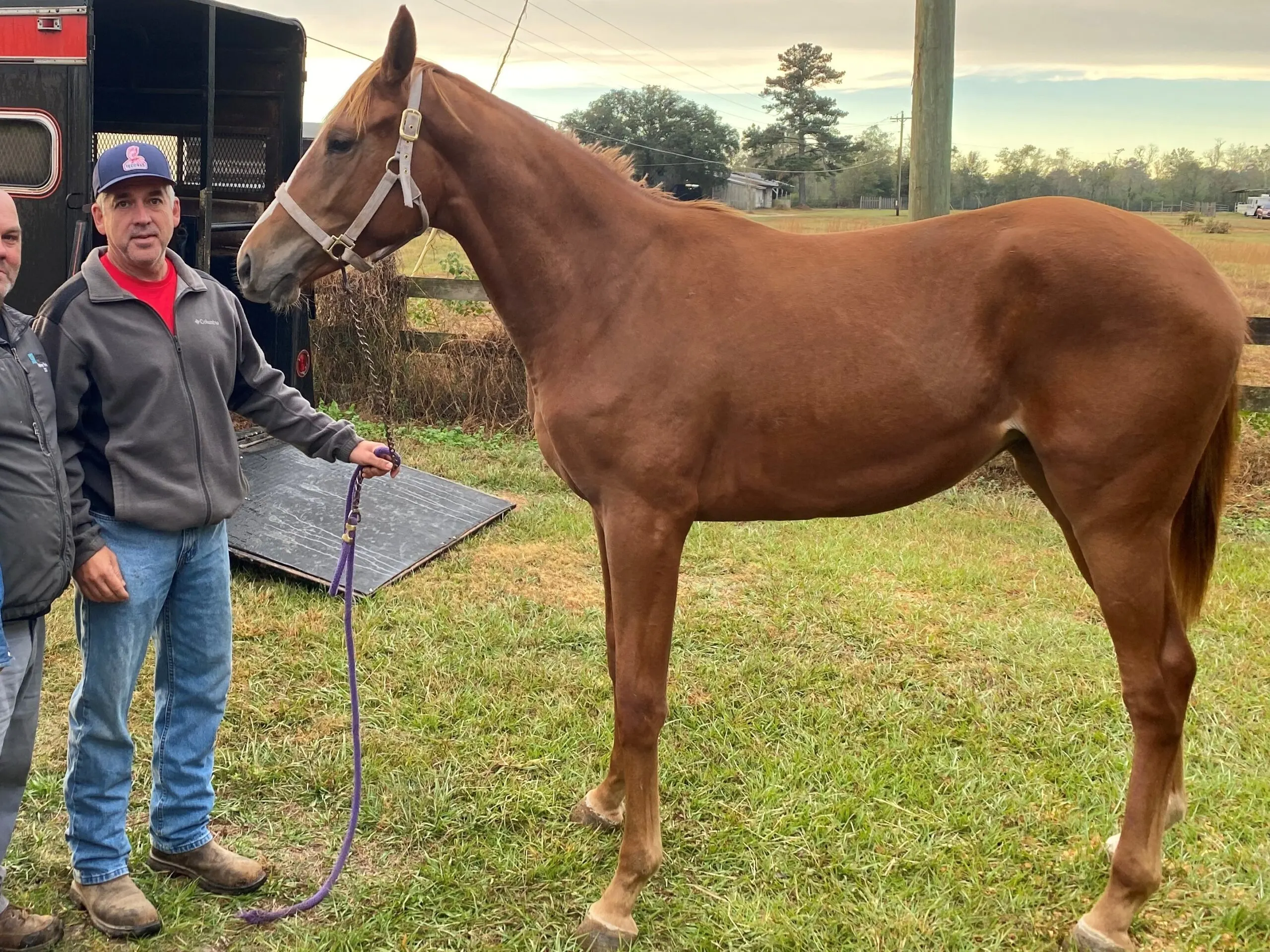Last updated: April 12, 2024
Horses are known for their speed, usually running 25 to 30 miles per hour. However, factors like the horse’s breed and how well they’re trained can change this. Thoroughbreds, especially those that race can run over 40 miles per hour.
This article looks into the fastest speeds recorded, what affects a horse’s speed, and how different breeds compare, providing a clear view of why horses run so fast.

Understanding Horse Speeds
Horses have varying speeds, with the average running at about 27 mph. However, racehorses can push the envelope, reaching speeds over 40 mph. A horse’s breed, age, and training significantly affect its maximum speed.
General Factors Affecting Speed
- Genetics: Certain breeds have speed-related traits.
- Training: Regular and specialized training enhances speed.
- Health: Overall, health impacts stamina and agility.
- Age: Younger horses are usually faster, but experience varies.
Average Speeds for Different Activities
- Walking: A calm, gentle pace averaging about 4 mph.
- Trotting: A steady gait with speeds ranging from 8 to 12 mph.
- Cantering: A controlled yet faster gait between 10 and 17 mph.
- Galloping: The fastest gait, where trained racehorses can reach speeds of 25 to 40 mph, depending on the breed and conditions.

Record-Breaking Speeds on the Track
- Fastest Recorded Speed: The title for the fastest racehorse speed goes to Winning Brew, a Thoroughbred, who achieved a breathtaking 43.97 mph (70.76 km/h).
- Notable Mention: Australian Thoroughbred, Black Caviar, undefeated in 25 races, known for her exceptional speed.
Comparative Speeds Across Horse Breeds
Horse breed significantly influences how fast a horse can run. This section compares the top speeds of fast horse breeds, showcasing the impact of genetic factors on their racing abilities.
| Breed | Speed |
|---|---|
| Thoroughbred | 43.97 mph* |
| Arabian | 35 mph |
| Quarter Horses | 55 mph |
| Akhal-Teke | 30 mph |
| Mustangs | 30 mph |
| American Paint Horse | 55 mph |
| Friesian horses | 30 mph |
| Belgian | 25 mph |
| Clydesdale | 20 mph |
| Shire | 25 mph |
| Irish Sport Horse | 35 mph |
| Andalusians | 30 mph |
| Hanoverian | 30 mph |

The Key Factors Behind a Horse’s Speed
What makes a horse fast? It’s a combination of genetics, muscle composition, and heart size. Breeds like Thoroughbreds, known for their racing prowess, have been bred for speed and endurance.
The physical build, including longer legs and powerful hindquarters, contributes significantly to a horse’s sprinting capability. However, horse speed is not just a matter of natural ability; several key factors are crucial in determining how fast a horse can run.
The Role of Genetics and Breeding
- Selective Breeding: Breeding programs often select horses for speed, focusing on traits like muscle composition, lung capacity, and overall conformation.
- Breed-Specific Characteristics: Different breeds have inherent speed capabilities. For instance, Thoroughbreds are bred for speed and agility, making them ideal for racing.
- Genetic Diversity: Incorporating diverse genetic lines can enhance speed and endurance, leading to superior racing qualities.
- Age: A study in the Journal of Equine Science analyzed the racing performance of Thoroughbred racehorses, revealing that their speed peaks between 4 and 5 years old. Citation: Journal of Equine Science, “The effect of age on the racing speed of Thoroughbred racehorses,” 26(2), 43-48, https://doi.org/10.1294/jes.26.43.
How Training Influences Speed
Training a horse to run fast is an art and science. It involves a regimen of conditioning, strength training, and proper nutrition. As an owner of six racehorses, I’ve seen firsthand how tailored exercise programs can enhance a horse’s performance on the track.
- Interval Training: Alternating between high-speed and low-intensity training improves cardiovascular health and speed.
- Strength Training: Exercises focusing on the hindquarters and core muscles enhance a horse’s power for faster acceleration.
- Consistency and Progression: Gradually increasing the intensity of training sessions helps in building speed without risking injury.
I evaluate these traits whenever I’m searching for a new racehorse. Because of this knowledge, I often find untapped potential and know I can significantly boost a horse’s speed, transforming them into standout contenders in the competitive racing world.
Here’s a short YouTube video about Training racehorses.
Maintaining Horse Health for Optimal Speed
Importance of Diet and Nutrition
A horse’s diet is crucial in maximizing its speed potential. High-quality feed rich in essential nutrients such as proteins for muscle repair, fats for sustained energy, and carbohydrates for quick energy boosts can significantly enhance performance.
Supplements may also be incorporated to address specific health needs and improve recovery and endurance.
Health Checks and Their Relevance to Performance
Regular veterinary check-ups are vital in maintaining a horse’s racing ability. These health checks help catch potential issues early, such as respiratory or musculoskeletal ailments, which could impede a horse’s speed and training.
Proper dental care, hoof maintenance, and parasite control are essential to ensure the horse remains in peak racing condition. These practices extend the horse’s competitive career and enhance its quality of life.

Horse Speed in Different Environments
Horses exhibit varying speeds depending on their environment, significantly influencing their capabilities and performance.
Wild vs. Racing
In the wild, horses typically run at speeds necessary for survival, often reaching up to 30-40 mph in short bursts to escape predators. This speed reflects natural instincts rather than sustained performance.
Conversely, racehorses are conditioned for higher speeds in competitive settings, achieving speeds over 40 mph due to selective breeding, rigorous training, and optimal track conditions.
Differences in Speed Capabilities
The primary difference in speed between wild and racing horses stems from their purpose and upbringing. Wild horses prioritize agility and endurance over short bursts, adapting to varied and often rough terrains.
Racehorses, however, are trained on flat, even surfaces designed to enhance their speed and reduce injury risks, allowing them to maintain higher speeds for longer periods.
Environmental Impacts on Speed
Environmental factors such as terrain, altitude, and weather conditions profoundly affect a horse’s speed. Wild horses often encounter uneven ground that requires careful navigation, which can limit their top speed.
Race tracks are meticulously maintained to ensure the fastest and safest conditions, promoting greater speed. Weather conditions like rain or extreme heat can affect wild and racehorse speeds by altering surface conditions and impacting the horses’ physical capabilities.
How Fast Can a Horse Run Compared to Other Species?
Here is the bar-chart diagram illustrating the speed comparison between a horse and some popular animals and humans:

The Science Behind Horse Speed
Horses’ remarkable speed is a feat of physical strength and a marvel of biological and psychological factors. Let’s delve into the anatomy and mindset that make horses swift athletes.
Anatomy and Physiology
- Muscle Composition: Fast-twitch muscle fibers in horses contribute to their explosive speed, allowing quick and powerful movements.
- Respiratory Efficiency: Horses have a large lung capacity relative to their body size, enabling more oxygen intake for sustained speed.
- Heart Size and Efficiency: A larger heart pumps more blood per beat, delivering more oxygen and nutrients to muscles during intense racing.
- Skeletal Structure: The unique skeletal structure, including long legs and a flexible spine, aids in longer strides and faster speeds.

The Psychology of Racing
- Temperament and Trainability: A horse’s willingness to learn and adapt to racing conditions is crucial for performance.
- Stress Management: Horses that can manage stress and remain focused under racing conditions tend to perform better.
- Bond with the Rider: A strong, trusting relationship between the horse and rider can enhance performance, as horses can sense and react to their rider’s cues and emotions.

Training Tips for Riders
- Start with a Solid Foundation: Begin training with a focus on basic commands and a strong rider-horse bond. A horse that trusts its rider responds better to speed training.
- Gradual Speed Increases: Incrementally increase the speed during training sessions to build endurance and speed without overstraining the horse.
- Use Interval Training: Mix short bursts of high-speed gallops with longer periods of slower gaits. This improves cardiovascular fitness and muscle strength.
- Focus on Flexibility and Agility: Incorporate exercises that enhance the horse’s agility, like pole work or controlled turns, to improve maneuverability at high speeds.
- Rider Fitness: A rider’s balance, fitness, and posture significantly affect a horse’s ability to run fast. Maintain a fitness regime that complements your horse training.

Historical Speed Records: Celebrating Milestones in Horse Racing
| Horse | Distance | Fastest Time | Year |
|---|---|---|---|
| Hawkster | 1½ miles | 2:22.8 | 1989 |
| Spectacular Bid | 1¼ miles | 1:57.8 | 1980 |
| Simply Majestic | 11/8 miles | 1:45 | 1988 |
| Schedule and With Probability | 1 mile 70 yards | 1:37.90 | 2004-05 |
| Dr. Fager | 1 mile (dirt) | 1:32 1/5 | 1968 |
| Mandurah | 1 mile (turf) | 1:31.23 | 2010 |
| Oklahoma Natural | 1/2 mile | 43.20 | 2012 |
| Winning Brew | 1/4 mile | 20.57 | 2008 |
These historical speed records, from Secretariat’s legendary run to Dr. Fager’s unmatched mile, highlight the extraordinary capabilities of racehorses. They continue to inspire and set the bar for future generations in the thrilling world of horse racing.
The annals of horse racing are filled with extraordinary speed records that have stood the test of time. These records are not just numbers; they represent the zenith of equine athleticism and the relentless pursuit of excellence. Among these, certain milestones have redefined the benchmarks for speed in horse racing.
Secretariat: The Epitome of Speed
- Record-Breaking Belmont Stakes: In 1973, Secretariat set an enduring record at the Belmont Stakes, completing the 1.5-mile race in a breathtaking 2:24. This record remains unbroken, symbolizing the pinnacle of speed in horse racing.
Here’s a YouTube video of Secretariat running the fastest Belmont Stakes ever.
Dr. Fager: The Mile Maestro
- Unmatched Mile Record: Dr. Fager, renowned for his incredible speed, set a benchmark in 1968 that still stands. He completed a mile on a dirt track in an astonishing 1:32 1/5 at Arlington Park. This record is a testament to his extraordinary speed and endurance.
- Legacy in Racing: Dr. Fager’s mile record is a significant milestone in horse racing, often cited as a standard for speed and performance.
Winning Brew: The World Record Holder
- Guinness World Record: Winning Brew holds the Guinness World Record for the fastest speed for a racehorse, reaching a top speed of 43.97 mph (70.76 km/h) over two furlongs in 2008.
- A Benchmark in Speed: This record showcases the advancements in training and breeding to maximize equine speed.
Man o’ War: A Racing Legend
- Dominance in the Early 20th Century: Man o’ War’s speed and dominance in the early 20th Century set the stage for the modern era of horse racing. His legacy extends beyond his victories, inspiring generations of racing enthusiasts.
Black Caviar: The Undefeated Sprinter
- An Impeccable Record: Australian sprinter Black Caviar retired undefeated in 25 races, a testament to her consistent speed and agility.
- Global Acclaim: Her unbeaten streak and dominant performances earned her international recognition, making her a symbol of speed and excellence.
Zippy Chippy: Beyond Winning and Losing
- A Different Kind of Fame: Known for losing 100 races, Zippy Chippy reminds us that in horse racing, the spirit and love for the sport often transcend the mere measure of speed.

FAQs
What is the average speed of a racehorse?
The average speed of a racehorse is roughly 37 mph. However, Thoroughbreds can reach speeds of up to 40-45 mph, with Quarter Horses capable of short bursts up to 55 mph.
How important is a horse’s diet in influencing its speed?
Extremely important. A balanced diet rich in proteins, fats, and carbohydrates is crucial for energy, muscle development, and overall performance.
Can any horse be trained to race?
While most horses can be trained to improve their speed, factors like breed, genetics, and physical health significantly determine a horse’s racing potential.
How does a rider’s skill affect a horse’s speed?
A skilled rider can significantly enhance a horse’s performance by maintaining proper balance, providing clear cues, and ensuring the horse is comfortable and responsive.
Below is a YouTube video about the fastest horses in the world.
Conclusion: How Fast Can a Horse Run?
The speed of a horse is a marvel of nature, further honed by centuries of selective breeding and careful training. From the wild mustangs to the elite racehorses in my stable, the capacity for speed in these animals is both a survival mechanism and a spectacle of sport.
Understanding the factors contributing to a horse’s speed deepens our appreciation for these incredible animals and the sports they dominate. Share your experiences and tips concerning fast horses in the comments. What strategies have you found effective in training your horse for speed? How do you ensure their well-being while pushing their limits?
Additional Resources
For a deeper understanding of horse speed and racing, check out these resources:
- Book: “The X Factor: What It Is & How to Find It” by Marianna Haun – This book delves into the genetic factors contributing to racehorses’ speed and endurance.
- Article: “Genetics of Thoroughbred Race Horse Performance“ – A comprehensive article discussing the role of genetics in the racing performance of horses.
- Online Resource: Equibase Speed Figure Chart—This Detailed Chart Explains how speed figures are calculated in horse racing. Visit Equibase.
- Documentary: “Secretariat: The Making of a Champion” – This documentary offers an in-depth look at one of the most famous racehorses ever. Watch on YouTube.
- Research Study: “Exercise during training is associated with racing performance in Thoroughbreds” – A detailed paper on various aspects of training and racing Thoroughbred horses. Read on ScienceDirect.

Thought-Provoking Questions For You to Ponder
- Genetic Influence vs. Training: How much of a racehorse’s speed is determined by genetics versus training? Exploring the balance between natural ability and the impact of rigorous training could provide readers with a deeper understanding of what makes a horse fast.
- Technological Advancements: How have technological advancements in training, nutrition, and veterinary care contributed to breaking speed records in horse racing over the years?
- The Role of the Jockey: What role does the jockey play in maximizing a horse’s speed during a race? Discussing the skills and strategies jockeys use could offer insights into the human element of horse racing.
- Breed-Specific Speeds: How do the top speeds of different horse breeds compare, and what specific physical attributes contribute to these differences?
- Long-Term Health Implications: What are the long-term health implications for horses that consistently perform at high speeds? Addressing concerns about joint wear, muscle strain, and overall longevity could provide a well-rounded perspective on the demands of racing.
Poll Question
Meet Miles Henry
An avid equestrian and seasoned racehorse owner, Miles Henry brings his extensive experience to the equine world, proudly associating with the AQHA, The Jockey Club, and various other equine organizations. Beyond the racetrack, Miles is an accomplished author, having published various books about horses, and is a recognized authority in the field, with his work cited in multiple publications.
🔗 Connect with Miles:
Twitter
Facebook
YouTube: Check out race highlights, horse care tips, and more!

